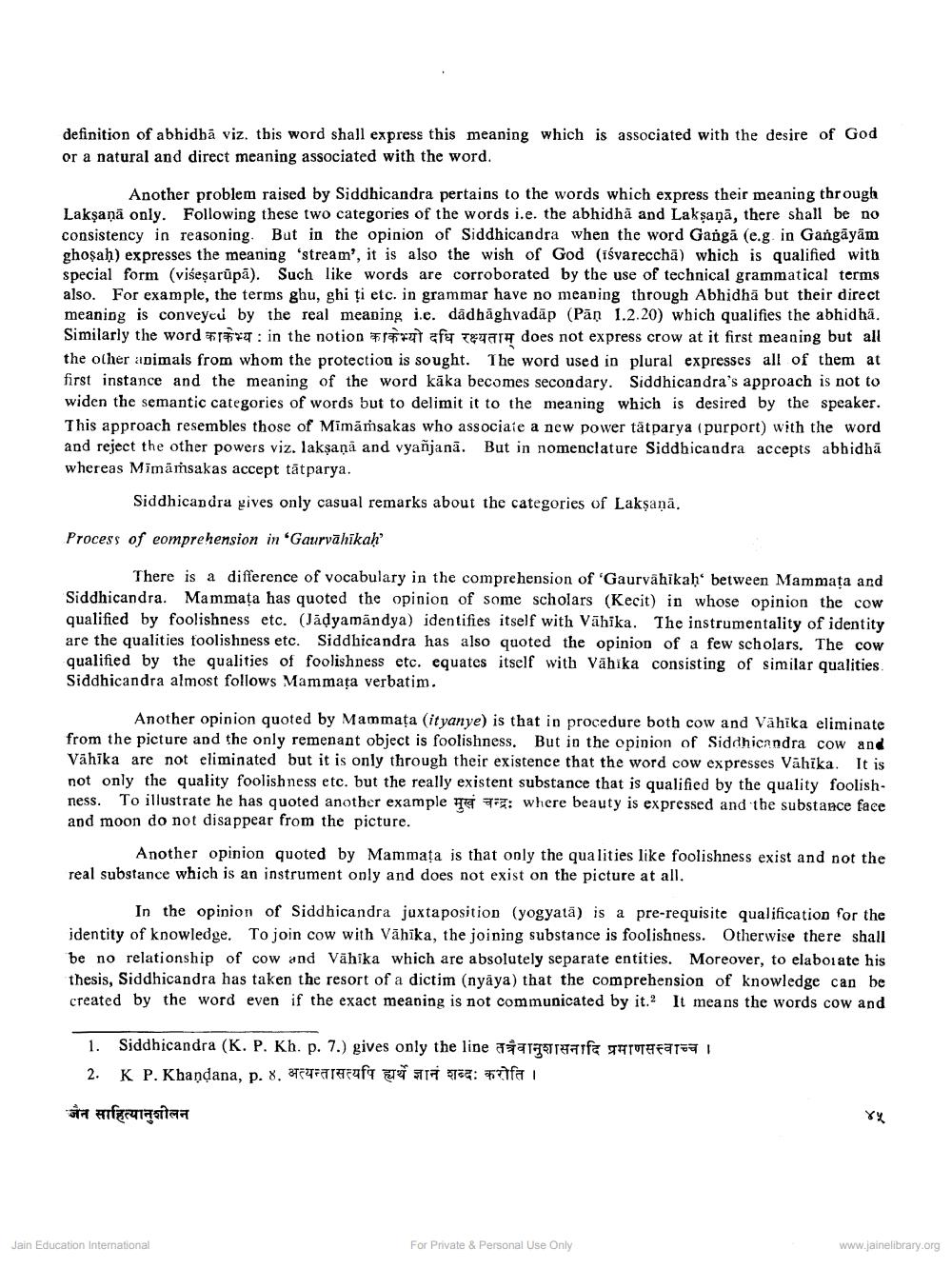________________
definition of abhidhā viz. this word shall express this meaning which is associated with the desire of God or a natural and direct meaning associated with the word.
Another problem raised by Siddhicandra pertains to the words which express their meaning through Lakşaņā only. Following these two categories of the words i.e. the abhidhä and Laksaņā, there shall be no consistency in reasoning. But in the opinion of Siddhicandra when the word Ganga (e.g in Gangāyām ghosah) expresses the meaning 'stream', it is also the wish of God (iśvareccha) which is qualified with special form (višeşarūpā). Such like words are corroborated by the use of technical grammatical terms also. For example, the terms ghu, ghi ți etc. in grammar have no meaning through Abhidhä but their direct meaning is conveyed by the real meaning i.e. dadhāghvadāp (Pāņ 1.2.20) which qualifies the abhidhä. Similarly the word u: in the notion #aut af teary does not express crow at it first meaning but all the other apimals from whom the protection is sought. The word used in plural expresses all of them at first instance and the meaning of the word kāka becomes secondary. Siddhicandra's approach is not to widen the semantic categories of words but to delimit it to the meaning which is desired by the speaker. This approach resembles those of Mimāṁsakas who associate a new power tätparya (purport) with the word and reject the other powers viz. Iakşaņā and vyañjanā. But in nomenclature Siddhicandra accepts abbidhā whereas Mimärsakas accept tatparya.
Siddhicandra gives only casual remarks about the categories of Lakşaņā.
Process of comprehension in "Gaurvāhīkah
There is a difference of vocabulary in the comprehension of 'Gaurvahikah between Mammața ard Siddhicandra. Mammața has quoted the opinion of some scholars (Kecit) in whose opinion the cow qualified by foolishness etc. (Jadyamándya) identifies itself with Vāhika. The instrumentality of identity are the qualities foolishness etc. Siddhicandra has also quoted the opinion of a few scholars. The cow qualified by the qualities of foolishness etc. equates itself with Vāhika consisting of similar qualities Siddhicandra almost follows Mammața verbatim.
Another opinion quoted by Mammata (ityanye) is that in procedure both cow and Vähika eliminate from the picture and the only remenant object is foolishness. But in the opinion of Siddhicandra cow and Vähika are not eliminated but it is only through their existence that the word cow expresses Vähika. It is not only the quality foolishness etc. but the really existent substance that is qualified by the quality foolishness. To illustrate he has quoted another example : where beauty is expressed and the substance face and moon do not disappear from the picture.
Another opinion quoted by Mammața is that only the qualities like foolishness exist and not the real substance which is an instrument only and does not exist on the picture at all.
In the opinion of Siddhicandra juxtaposition (yogyatä) is a pre-requisite qualification for the identity of knowledge. To join cow with Vāhika, the joining substance is foolishness. Otherwise there shall be no relationship of cow and Vähika which are absolutely separate entities. Moreover, to elaboiate his thesis, Siddhicandra has taken the resort of a dictim (nyāya) that the comprehension of knowledge can be created by the word even if the exact meaning is not communicated by it. It means the words cow and
1. Siddhicandra (K. P. Kh. p. 7.) gives only the line a r if TUFTEI 2. K P. Khandana, p. 8, 374Faraf Ter a : fa 1
जैन साहित्यानुशीलन
Jain Education International
For Private & Personal Use Only
www.jainelibrary.org




